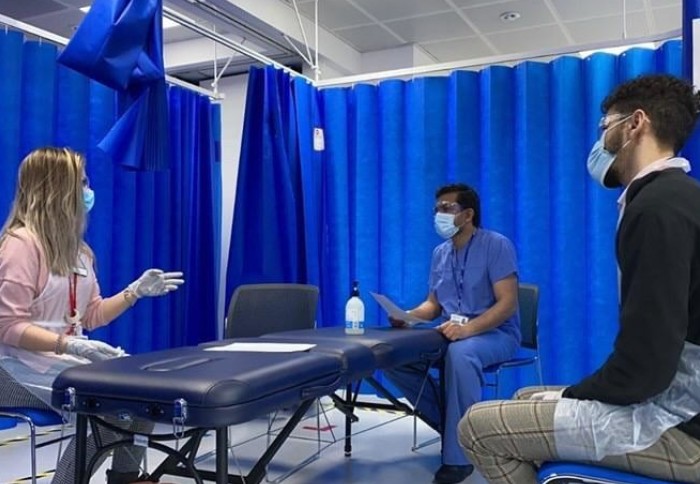Imperial medics amongst most satisfied in UK, 2021 National Student Survey shows

Head of ICSM, Professor Amir Sam speaking with medical students during students’ union-led formative clinical assessments
Imperial College School of Medicine (ICSM) achieved 92% overall satisfaction for the Medicine programme in this year’s National Student Survey.
The figure, up 2% on 2020, places Imperial’s Medicine (MBBS) programme a significant ten percentage points ahead of this year’s 82% sector-wide average, and above the College-wide average of 84.5%.
Head of Imperial College School of Medicine (ICSM), Professor Amir Sam, said, “After an incredibly difficult year, we are even more proud of these encouraging figures.
We know that, despite challenges set by the Covid-19 pandemic, our students have appreciated the high-quality experience we aim consistently to provide. My thanks go to each and every staff member who has played a part in this, including all those at our partner NHS Trusts who have contributed hugely despite immense extra pressure this year.”
Medical student engagement with the survey also increased by 5% on last year, reaching 86% overall.
Excellence in experience
Dr James Jensen-Martin, Director of Quality and Student Experience, praised the dedication and collaboration between teams, “We are incredibly proud of the student experience that we offer and are delighted our graduates this year feel the same way. Their feedback reflects the dedication and commitment of the teams of educators in the College and our clinical partners. both through this challenging year and in the consistent efforts in years past. These collaborations are key to providing the cohesive and enjoyable experience we aim to ensure for every student.
“We will continue to review and analyse the data from this year’s survey, working in collaboration with our students, to put in place action plans to ensure continued improvement across all areas.”
Curriculum innovation
Committed to adapting and improving its offering, ICSM continues rolling out its reimagined MBBS programme this autumn.
Professor Sam added, “Our curriculum review for the MBBS was a huge undertaking that required the dedication and teamwork of many of our staff, and we’re seeing the benefits of the changes really come through in our wider student feedback.
“We are always looking for ways to improve our students’ education and experience, and to integrate innovations and new learning opportunities into our programmes. At the height of the Covid-19 pandemic, we still maintained our forward-thinking approach, rolling out use of initiatives such as mixed-reality technology with the Microsoft HoloLens.
“Our students expect a very high standard of education and experience from us, and we are committed to ensuring we offer this across our curriculum and our community.”

Increasing improvement
The School saw increased medic satisfaction in survey themes such as Teaching, with 88% satisfied compared to 84% in 2020. Particular praise was given for the intellectually stimulating nature of medical teaching, achieving 91%, with 94% agreement for the quality of explanation staff provide.
The Academic Support theme also rose in overall satisfaction to 82%, and a 3% increase in the Student Voice category.
Across the School of Medicine, the undergraduate programme in Medical Biosciences (BMB) saw an increase of 25% on its previous satisfaction rates, making it the most improved programme at the College.
85% satisfaction was reported for the Learning Resources theme, up 6% on 2020, with 82% in the Teaching theme, up 13%. The Academic Support theme also saw significant improvement, rising 25% to 67%.
BMB students highlighted too the Learning Opportunities theme, with the programme achieving 83% satisfaction for its offering.
Professor Alison McGregor, Head of BSc Medical Biosciences, said, “We’re really pleased to see such significant increases in our students’ satisfaction this year. The programme is still in its very early stages and is constantly evolving, and we’re hugely grateful to our students for working with us in partnership to refine it and to ensure it goes from strength to strength in future.
“We offer some incredible opportunities as part of the programme and are excited to see where our innovative teaching methods and collaborations between our students, research labs and industry partners will go. I’m really proud of everyone who’s been involved in this programme so far, and offer them all my thanks for their commitment and hard work in building and improving it.”

Student collaboration
Students remain firmly at the heart of ICSM, with their feedback and input a key driver in all changes across the School’s breadth of activity, reflected in the 3% and 25% increases in the Student Voice theme for Medicine and Medical Biosciences respectively.
The School aims to ensure the student voice is heard every step of the way, with a variety of StudentShapers programmes, collaborative changes to teaching through the Staff-Student Liaison Groups and fora throughout the academic year. Staff and student representation is included on committees and groups tackling wider issues across the School, such as the implementation of the British Medical Association’s Charter for medical schools to prevent and address racial harassment. In addition, a busy programme of campus developments is underway across the medical campuses, with student representation feeding in.
President of the Imperial College School of Medicine Students’ Union (ICSMSU) for 2020-21, Mr Muntaha Naeem, said,
“Our ICSMSU student representatives have put in a huge amount of work in the past year on even closer student-staff collaboration, which has allowed many positive changes and improvements for our student body. It's great to hear that these efforts are paying off in such a significant way, particularly for our BMB students.
These NSS results help highlight what is being done well, as well as signal the areas and ways of moving forward to keep improving our student experience.”
Article text (excluding photos or graphics) © Imperial College London.
Photos and graphics subject to third party copyright used with permission or © Imperial College London.
Reporter
Dorrit Pollard-Davey
Faculty of Medicine Centre